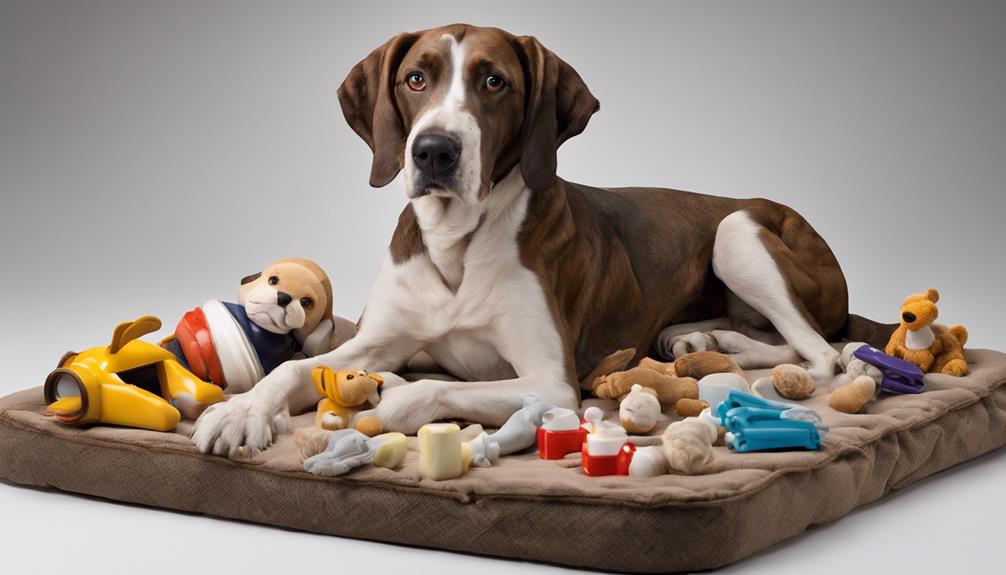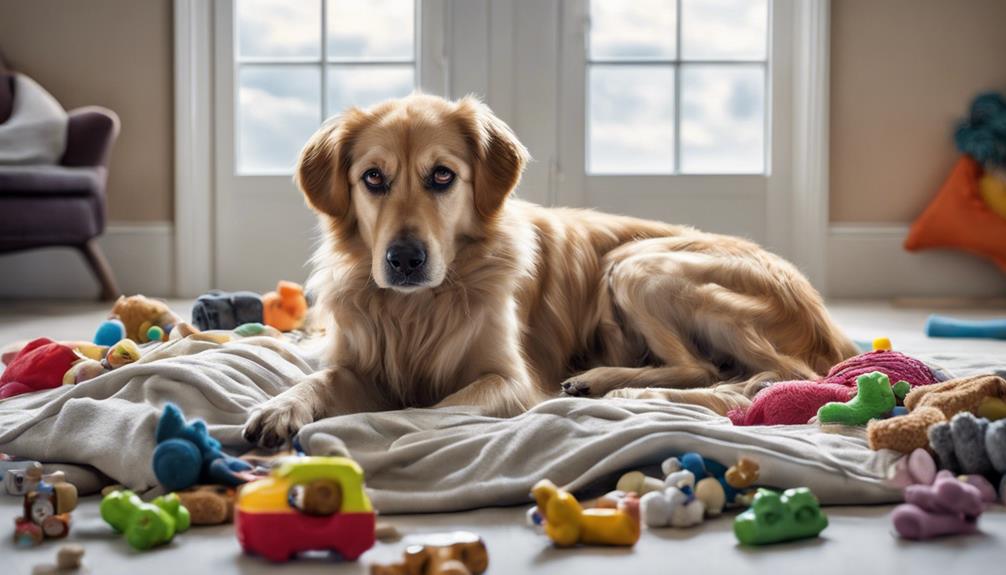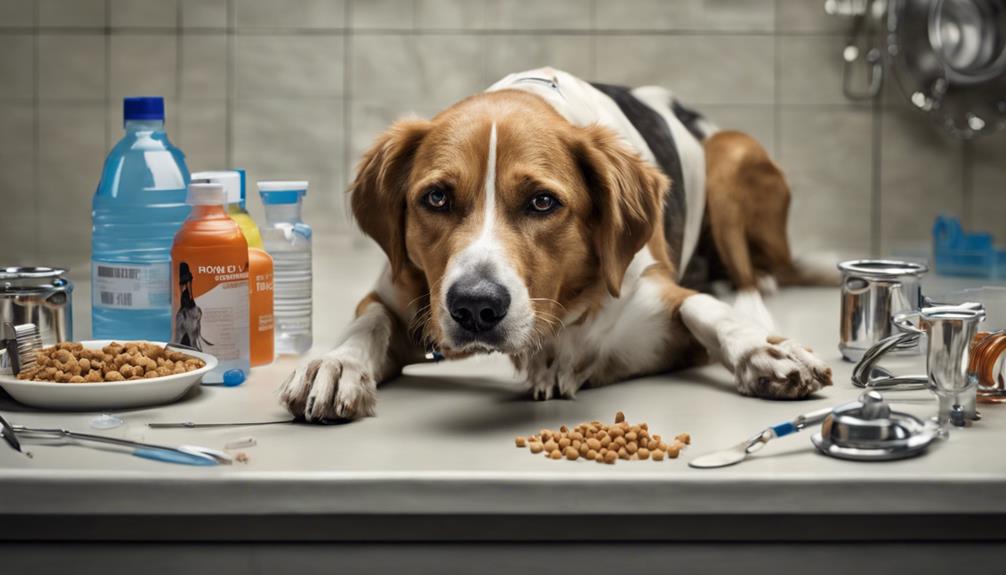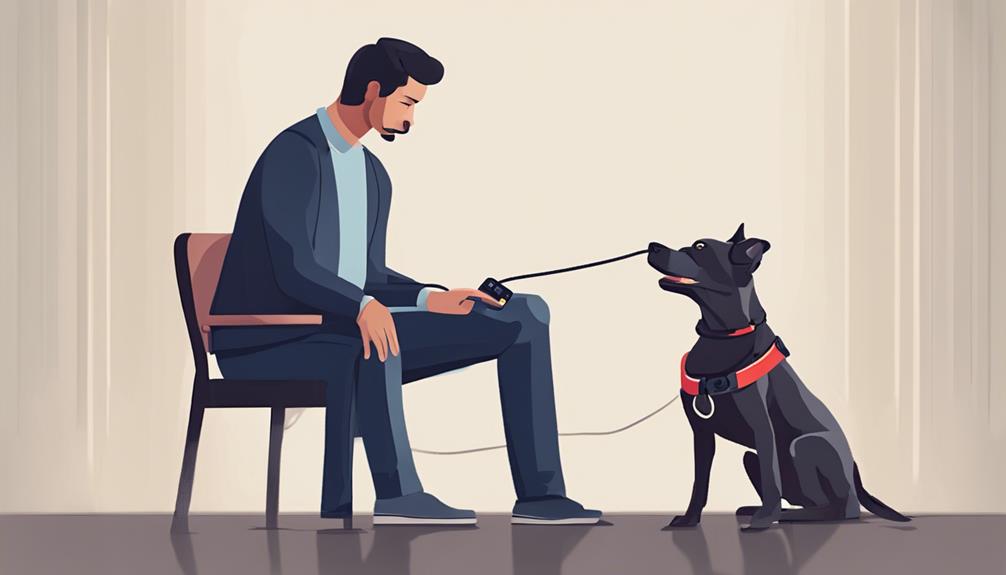Yes, dogs can feel sad or show behavioral changes after being neutered, which might suggest depression. Factors like anesthesia effects, hormone shifts, and post-op pain can influence their mood. Watch for signs like less energy, appetite changes, or avoidance behaviors. Seeking advice from a vet is crucial. Understanding these behaviors helps in offering support. Behavioral changes may include increased aggression but can lead to positive outcomes. Providing mental stimulation, exercise, and social interactions are crucial coping strategies. Overall, knowing the signs and seeking professional help are important for your neutered pet's well-being.
Key Takeaways
- Neutered dogs can experience temporary feelings of sadness due to anesthesia effects and hormonal changes.
- Watch for signs like increased lethargy or decreased interest in activities post-neutering.
- Seek advice from a veterinarian to address behavioral changes and signs of depression.
- Coping strategies include exercise, social interactions, and mental enrichment for well-being.
- Neutering benefits long-term health, behavior, and overall well-being of dogs.
Factors Influencing Dog Depression After Neutering
When considering factors that influence dog depression after neutering, it's important to recognize the impact of anesthesia effects, hormonal changes, and post-operative pain. Depression in dogs post-neutering can be a significant concern for pet owners.
Anesthesia effects, which are necessary for the surgery, can sometimes lead to temporary feelings of sadness or lethargy in dogs. Additionally, the hormonal changes that occur after neutering can affect your dog's mood and behavior, contributing to symptoms of depression.
The post-operative pain experienced by dogs can also play a role in their emotional well-being, potentially leading to decreased interest in activities they once enjoyed. Understanding these factors is vital in helping your furry friend cope with any feelings of depression they may experience after being neutered.
Recognizing Signs of Depression in Neutered Dogs

When observing your newly neutered dog, pay attention to changes in their behavior. This could include increased lethargy or loss of interest in playtime. Look out for physical signs as well, such as changes in appetite or decreased interaction with family members.
If you notice any concerning behaviors, seeking advice from a professional veterinarian is essential for ensuring your dog's well-being.
Behavioral Changes Post-Neutering
After being neutered, dogs may display behavioral changes that can indicate signs of depression, including increased lethargy and loss of interest in activities. These changes may manifest as decreased appetite, reluctance to move around, or staring off into space.
It's vital to pay attention to your dog's behavior post-neutering, as some dogs may exhibit symptoms of sadness or depression. Recognizing these signs is critical for providing the necessary care and support.
Physical Symptoms to Watch
To identify physical symptoms of depression in neutered dogs, observe for changes in their activity level and interest in activities. Neutered dogs experiencing depression may show decreased energy, reluctance to play, or disinterest in their favorite toys. Keep an eye out for changes in appetite, weight loss, or excessive tiredness, as these can be signs of a dog feeling down.
Additionally, watch for behaviors like excessive licking, hiding, or avoiding interactions with family members or other pets. If your neutered dog starts displaying unusual sleep patterns or increased vocalization, it could also indicate they're struggling emotionally. Monitoring these physical symptoms closely is essential in recognizing and addressing depression in your furry friend.
Seeking Professional Veterinary Advice
Observing changes in behavior and mood after neutering can help us identify signs of depression in dogs, prompting us to seek professional veterinary advice.
When it comes to recognizing signs of depression in neutered dogs, it's vital to pay attention to their behavior changes.
To guarantee our furry friends receive the best care, seeking professional veterinary advice is paramount.
Here are four key reasons why seeking professional help is important:
- Expert Evaluation: Veterinarians can accurately assess your dog's behavior post-neutering.
- Tailored Recommendations: Professionals can provide personalized advice and treatment options.
- Differentiation Support: They can help distinguish between typical adjustments and depressive symptoms.
- Supportive Care: Professionals offer guidance to address and manage signs of depression effectively in neutered dogs.
Understanding Post-Neutering Behavioral Changes in Dogs

Our understanding of post-neutering behavioral changes in dogs continues to evolve as research sheds light on the effects of this common procedure. Neutering can indeed lead to mood changes in dogs, such as a temporary increase in aggression in male dogs. However, it's vital to note that these changes are often temporary and may subside as the dog adjusts to the hormonal changes post-neutering.
Behavioral changes post-neutering can also include positive outcomes, like a reduced likelihood of wandering off, less humping behavior towards other dogs, and decreased sporadic urination at home. Overall, neutering can bring about improved health, longer life expectancy, and calmer behavior in male dogs. It's important for pet owners to be aware of these potential changes and provide their furry companions with the necessary support and care during this adjustment period.
Coping Strategies for Neutered Dogs With Depression

When helping neutered dogs cope with depression, it's important to prioritize their mental well-being.
Engaging in regular exercise can greatly boost their mood and overall mental health.
Additionally, social interaction and providing enrichment through activities can help them combat feelings of sadness and loneliness.
Exercise for Mental Health
Engaging in regular physical activity is essential for maintaining the mental well-being of neutered dogs, helping to alleviate stress and promote a sense of overall happiness. Here are four ways exercise can benefit neutered dogs with depression:
- Stress Reduction: Exercise helps lower stress levels in neutered dogs, contributing to a calmer and happier demeanor.
- Endorphin Release: Physical activity post-neutering stimulates the release of endorphins, enhancing feelings of well-being.
- Energy Outlet: Regular exercise provides an outlet for pent-up energy, preventing destructive behaviors linked to depression.
- Bond Enhancement: Play sessions and interactive games strengthen the bond between owners and neutered dogs, fostering emotional well-being.
Social Interaction Importance
To support the mental well-being of neutered dogs, regular social interactions play an essential role in helping them cope with post-surgery depression. Engaging in playtime, walks, and training sessions can positively impact a neutered dog's emotional well-being.
Providing a structured routine and maintaining consistent social interactions can help alleviate post-neutering depression in dogs. Interactive toys, puzzles, and activities that stimulate the mind can prevent feelings of loneliness and sadness in neutered dogs.
Creating a supportive and loving environment with regular social engagement can greatly improve a neutered dog's mood and mental health. Remember, spending quality time with your neutered dog through social interactions is key to helping them navigate the challenges they may face after surgery.
Enrichment Through Activities
Enriching neutered dogs' lives through stimulating activities is essential for alleviating depression symptoms and promoting mental well-being. Here are four enrichment activities that can help your neutered dog cope with depression after surgery:
- Puzzle toys and interactive games: Engage your dog's mind and keep them entertained.
- Regular exercise: Daily walks or play sessions can improve mood and overall well-being.
- Training sessions: Obedience classes or agility courses provide mental stimulation and a sense of accomplishment.
- Social interactions: Supervised playdates with other dogs can reduce loneliness and isolation.
Seeking Professional Help for Depressed Neutered Dogs

Professional help for depressed neutered dogs typically includes behavioral therapy sessions. These sessions focus on addressing the specific issues causing distress in your dog.
Veterinarians may also prescribe medication to help manage depression in neutered dogs. Additionally, seeking support from online forums or local support groups can provide guidance and advice from others who've experience with depressed pets.
If the situation is more severe, consulting with a veterinary behaviorist can be beneficial. These professionals can create a tailored plan to help your dog overcome their depression.
Regular check-ups with the vet are essential to monitor your dog's progress and make any necessary adjustments to their treatment plan. Remember, seeking help is a proactive step towards improving your neutered dog's mental well-being.
Long-Term Well-being of Neutered Dogs

Neutered dogs experience long-term benefits, including a reduced risk of testicular cancer and prostate disease, improved behavior, and overall health. Here are four key points to contemplate for the long-term well-being of neutered dogs:
- Reduced Health Risks: Neutering helps lower the chances of testicular cancer and prostate disease in male dogs, contributing to their overall well-being.
- Improved Behavior: Neutered males are less likely to exhibit behaviors such as roaming, fearfulness, or hyperarousal, leading to a calmer and more stable temperament.
- Positive Impact on Aggression: While aggression levels can vary by breed, neutering can help reduce aggressive tendencies in male dogs, promoting a safer and more harmonious environment.
- Enhanced Happiness: Neutering can lead to happier male dogs by reducing stress and contributing to their overall well-being, resulting in a more content and fulfilled pet.
Frequently Asked Questions
How Long Will My Dog Be Depressed After Neutering?
After neutering, your dog's depression can last from a few days to a couple of weeks. Factors like anesthesia effects and hormonal changes contribute to this.
To help, create a comforting environment, engage in positive activities, and stick to a routine. Monitor your dog closely, and if the depression persists, consult a vet.
Most dogs recover with time, love, and support.
Do Male Dogs Change After Being Neutered?
After being neutered, male dogs can go through substantial changes. They may become more tranquil, less combative, and happier overall.
Neutering can also decrease the likelihood of roaming, mounting behavior, and sporadic urination at home. These alterations are typical and generally advantageous for both the dog and the owner.
It's important to provide proper care and attention during this period of adjustment to guarantee the dog's well-being.
What Are the Psychological Effects of Neutering a Dog?
Neutering dogs can have various psychological effects. It can lead to initial changes in behavior, such as increased aggression, but can ultimately result in calmer and happier male dogs.
The impact of neutering on a dog's psychological well-being may vary based on factors like breed and individual temperament. Overall, neutering is beneficial for reducing the risk of certain health issues and can contribute to a dog's overall well-being.
Do Dogs Settle Down After Being Neutered?
After being neutered, male dogs typically settle down due to the decrease in hormone-driven behaviors. They may become calmer, less aggressive, and less likely to wander off. This can lead to a more content and stable demeanor.
Neutering can play a significant role in shaping a dog's behavior positively, contributing to a happier and more settled life for both the dog and its owners.
Conclusion
To summarize, while some dogs may experience temporary behavioral changes after being neutered, depression isn't a common side effect. Factors such as age, health, and environment play a significant role in a dog's emotional well-being.
By recognizing signs of depression, understanding post-neutering behavioral changes, implementing coping strategies, and seeking professional help when needed, pet owners can guarantee the long-term well-being of their neutered dogs.
It's important to provide love, support, and proper care to help dogs adjust to this life change.









